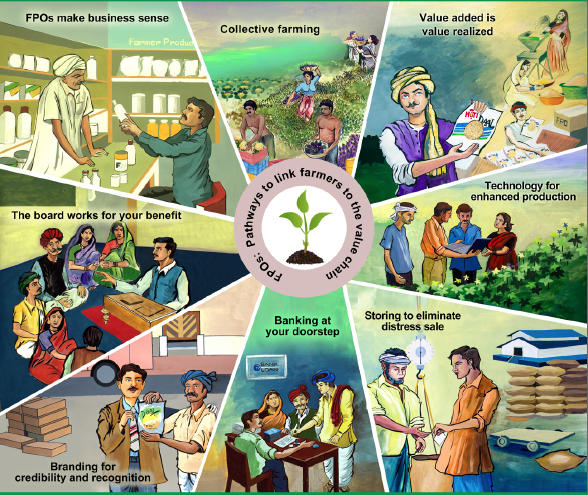The formation and promotion of Farmer Producer Organizations (FPOs) has gained significant attention in recent years, as it holds immense potential to transform the agricultural landscape. FPOs are essentially collective entities formed by farmers, enabling them to join forces, pool resources, and enhance their bargaining power. Under the central scheme titled ‘Formation and Promotion of 10,000 FPOs’, the government has allocated 1,100 FPOs to the National Cooperative Development Corporation (NCDC) to bolster the cooperative sector and provide comprehensive support to small farmers.
Features and Functionality
FPOs serve as a platform for farmers to come together, share knowledge and experiences, and collectively address common challenges. These organizations offer end-to-end services that encompass various aspects of cultivation, including inputs, technical support, processing, and marketing. By leveraging economies of scale, FPOs help small producers access better prices, reduce transaction costs, and enhance overall productivity.
Benefits:
- Empowering Farmers: FPOs empower farmers by fostering a sense of ownership and collective decision-making. They enable farmers to actively participate in the entire value chain, ensuring better income and livelihoods.
- Market Linkages: FPOs establish direct market linkages, cutting out intermediaries and ensuring fair prices for farmers. By eliminating the information asymmetry and non-transparency prevalent in traditional marketing channels, FPOs enable farmers to earn a higher share of the consumer’s price.
- Access to Resources: Through aggregation, FPOs provide small farmers with increased access to production inputs, credit facilities, modern technology, and quality agricultural practices. This facilitates productivity enhancement and reduces dependency on external sources.
- Skill Development and Capacity Building: FPOs facilitate skill development programs and capacity-building initiatives for their members. Farmers receive training on modern farming techniques, market trends, and value addition, enhancing their overall capabilities.
Successful Implementation and Expansion
The government’s dedicated Central Sector Scheme, along with the involvement of implementing agencies such as Small Farmers Agri-business Consortium (SFAC), NCDC, and NABARD, has been instrumental in the successful establishment and expansion of FPOs. The allocation of funds, technical support, and expert guidance have contributed to the growth and sustainability of these organizations.
Beneficiaries:
FPOs primarily benefit small and marginalized farmers who often face challenges due to limited resources, fragmented landholdings, and a lack of market access. By fostering collective action and providing a supportive ecosystem, FPOs uplift farmers, particularly those in remote and underdeveloped regions.
Drawbacks:
While FPOs hold immense potential, there are certain challenges that need to be addressed. These include the need for effective governance, capacity building at the grassroots level, coordination among various stakeholders, and ensuring the long-term sustainability of FPOs beyond the initial support period.
Funding:
Under the central scheme, each FPO receives financial assistance of Rs 33 lakh, enabling them to establish and strengthen their operations. Cluster-Based Business Organizations (CBBOs) also receive financial aid of Rs 25 lakhs per FPO to support their activities.
Vision:
The vision behind the formation and promotion of FPOs is to create a robust and inclusive agricultural ecosystem that empowers farmers, enhances their incomes, and ensures sustainable growth. By nurturing cooperative models, integrating primary Agricultural Credit Societies (PACS), and fostering an enabling environment, FPOs are expected to play a pivotal role in transforming Indian agriculture.


 Indian Olympic Medal Winners List Till N...
Indian Olympic Medal Winners List Till N...
 Who is the Inventor of the Gramophone?
Who is the Inventor of the Gramophone?
 HS Dhaliwal Appointed New DGP Of Andaman...
HS Dhaliwal Appointed New DGP Of Andaman...
